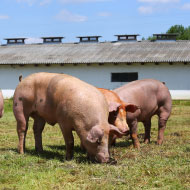
Confirms structures are similar to those in same virus family
The sites within the cell where porcine deltacoronavirus (PDCoV) makes new copies of itself during replication have been uncovered, in a study carried out at The Pirbright Institute.
According to a statement, the research confirmed that PDCoV uses the host cell’s machinery to create two different structures that form the replication organelle. These structures are very similar to those created by infectious bronchitis virus (IBV), a Gammacoronavirus that causes debilitating disease in chickens.
Using electron microscopy, Pirbright researchers where able to confirm their prediction that the structures formed by PDCoV when replicating would be comparable to those formed in replication sites in the other three genera of the coronavirus family – which have already been well defined.
This evidence suggests that there are further similarities across the family which could be targeted and used in the development of vaccines, antivirals and coronavirus resistance breeding programmes.
Head of Pirbright’s nidovirus-cell interactions group Dr Helena Maier said: “Imaging porcine deltacoronavirus during host cell infection provides an important insight into the replication mechanisms used by this group of viruses.
“This is particularly important since other Deltacoronaviruses cannot be adapted to cell culture, which makes it very challenging to study how they replicate and interact with the host cellular machinery.”
This study will inform the group’s further work in understanding how the coronavirus family interacts with host cells, and could lead to the development of broad-spectrum control methods to tackle the diseases caused by this virus family.



 RCVS Knowledge has welcomed Professor Peter Cockcroft as editor-in-chief for Veterinary Evidence.
RCVS Knowledge has welcomed Professor Peter Cockcroft as editor-in-chief for Veterinary Evidence.